Sympathy for the devil in Forgiven Children
Peter Breedveld
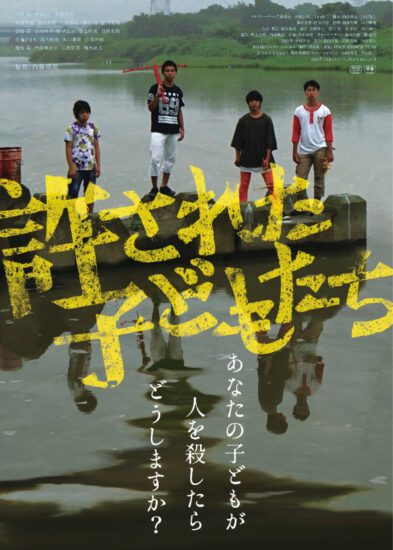
Director Naito Eisuke doesn’t spare his viewers. His film Forgiven Children begins with the shocking scene of a dying boy, Itsuki, covered in blood, stumbling on a road. A woman from his town finds him there and embraces him as he is dying, holds him close to her while she’s crying.
The deep red of Itsuki’s blood is then countered in the next scene by the icy blue of the popsicle his killer is eating. This is Kira and he’s watching his friends demolish a set of colorful puppets along the side of a road, apparently made by children for some festival. Kira doesn’t join them until he sees a little girl with Down syndrome watching them. This seems to be the incentive for him to partake in the destruction. Kira is established as a school example of a bully.
The police comes and they all run away, Itsuki among them, we’ve jumped back in time a little. It’s an exciting scene, dynamically filmed like in a 70’s cop show, underscored by exhilarating music. Rebelling adolescents defying authority.
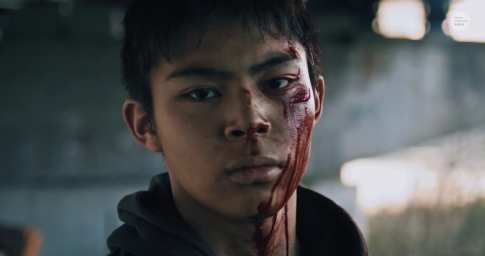
Crossbow made of chop-sticks
Things get grim when the boys play with a crossbow made of chop-sticks at a river’s side. One of them, an awkward boy, Gurimu, irks Kira who points the crossbow at him. Itsuki positions himself between Kira and Gurimu to protect the latter and Kira shoots him in his neck. The boys panic and run away, leaving Itsuke there.
But they are caught on surveillance camera’s and a policeman pressures Kira into a confession, after sending his parents away. This is used by Kira’s lawyer to have the confession declared void. She also pressures Gurimu, who is the only one of the group of boys testifying against Kira, into withdrawing his statement. Kira’s mother gives him an alibi by lying about the time Kira came home on the day of Itsuki’s death. She shocks her husband who is seen in a mirror, watching her in silent disbelief as she slurps her soda after lying to the lawyer.
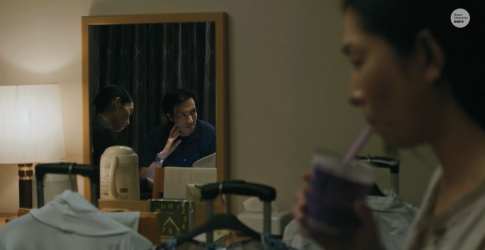
The trial is a disturbingly formal affair, with the judge threatening to have Ituki’s parents removed if they insist venting their grief in such an emotional way. He forbids them to carry a framed portrait of their son in the court-room and eventually decides it can’t be ruled out that Itsuki’s death was a tragic accident and therefore Kira walks free.
Public reckoning
Which means he’s denied, by the grown-ups around him, the chance to be accountable for what he’s done, to take responsibility for it and learn to live with it. But Itsuki’s parents, the media and the public will have none of it and in the rest of the film we see Kira and his parents, his mother mainly, trying to erase any reminder of what Kira has done while the media, not in the least the lynch-mobs on social media, frantically vying for the public reckoning they feel they are entitled to.
The self-righteous cruelty they display in their quest for justice makes them bullies themselves. In fact, Naito’s film seems to be an exploration of what bullying is. There’s a lengthy scene in a classroom with pupils discussing how to tackle the problem of bullying. Not everyone seems to agree the bully is the problem, but the person being bullied should do some self-searching. One of the girls in class is a victim of bullying by the rest of the pupils, who see it as punishment for an affair she is assumed to have had with one of the teachers.
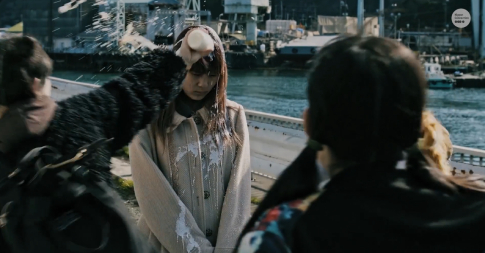
Confessing of sins
For Kira bullying is his way to make people submit to his authority. He and his mother are in turn bullied by the public into confessing their sins and accepting their punishment, in order to have society’s desire satisfied for what it sees as justice. Itsuki’s parents are bullied by the judge into suppressing their emotions and suffering in silence, so as not to be a nuisance to their community.
Kira proves to be incorrigable. He keeps beating people up and destroys the improvised shrine Gurimu made for his dead friend Itsuki. He is rotten to the core, but you can’t help sympathising with him. Because it’s also clear that Kira is broken inside, as broken as the world in which he lives.
Film Reviews, Japan, 21.08.2020 @ 11:36


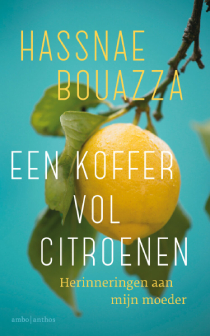
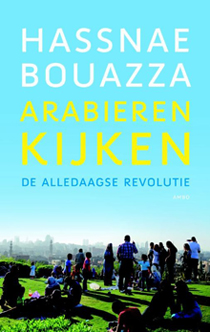


 RSS
RSS